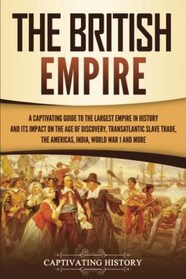One of the most exciting segments of this story was the different views of English history concerning the Colonies. While the English Civil War waged in their homeland, England ignored the Colonies. In turn, the Colonies began to look to themselves for assistance. I found that to be a unique way of looking at how the Colonies began to separate from England.
The East India Company had a larger army than Great Britain. Queen Elizabeth gave the group a monopoly on trading in the East. Any attempt to break the monopoly would cause perpetrators to lose ships and cargo, plus earn prison sentences. The East India Company could mint money, claim lands, and make war.
The info that still staggers me is that trans-Atlantic slavery paid for the British Industrial Revolution. The British may have outlawed it in 1803, but they were involved in it far longer. Next, this book gives some interesting reasons why the West Indies did not join America in the War for Independence. Although the West Indies had the same plantation systems as southern states, they had unique issues that kept them tied to England. This book is interesting because it looks at history from a different point of view from usual. In turn, this offers more insights.
The end of the book concerned the growing nationalism of the colonies, protectorates, and dominions of Great Britain, which led to their independence. Generally, Great Britain fought these uprisings and demands for freedom with all their might.
Finally, however, world opinion and the continuously rising costs of keeping people in England's realm led to change.
This is a highly readable history of the British Empire. I enjoyed the analysis and different perspectives.
The East India Company had a larger army than Great Britain. Queen Elizabeth gave the group a monopoly on trading in the East. Any attempt to break the monopoly would cause perpetrators to lose ships and cargo, plus earn prison sentences. The East India Company could mint money, claim lands, and make war.
The info that still staggers me is that trans-Atlantic slavery paid for the British Industrial Revolution. The British may have outlawed it in 1803, but they were involved in it far longer. Next, this book gives some interesting reasons why the West Indies did not join America in the War for Independence. Although the West Indies had the same plantation systems as southern states, they had unique issues that kept them tied to England. This book is interesting because it looks at history from a different point of view from usual. In turn, this offers more insights.
The end of the book concerned the growing nationalism of the colonies, protectorates, and dominions of Great Britain, which led to their independence. Generally, Great Britain fought these uprisings and demands for freedom with all their might.
Finally, however, world opinion and the continuously rising costs of keeping people in England's realm led to change.
This is a highly readable history of the British Empire. I enjoyed the analysis and different perspectives.




